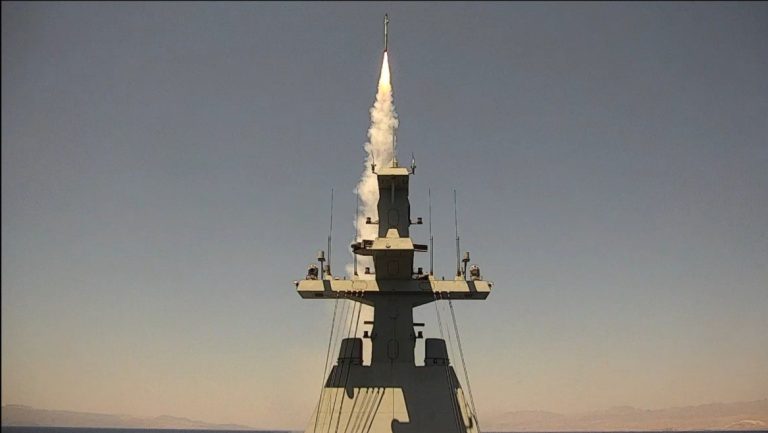
The security cooperation between Israel and India continues to deepen and expand, with the first visit of the Director General of the Israeli Ministry of Defense, Major General (Res.) Amir Baram, to India in July 2025 marking a significant milestone in strengthening the strategic relations between the two countries. This visit, aimed at advancing defense collaborations, underscores the growing importance of advanced defense systems, particularly the Barak 8 system, as a response to escalating threats from Iran and the Houthi rebels in Yemen.
**Background: Israel-India Defense Relations**
Since the establishment of full diplomatic relations in 1992, Israel and India have developed a deep strategic partnership, particularly in the defense sector. India, one of the world’s largest arms importers, views Israel as a key partner in the development and procurement of advanced weapons systems. Estimates suggest that Israeli defense sales to India in the past year amounted to approximately $1.5 billion, encompassing joint development, local production in India, and technology transfers.
The partnership has significantly strengthened over the past decade under Indian Prime Minister Narendra Modi’s “Make in India” policy, which mandates local production of defense systems as a condition for procurement. Israeli companies such as Israel Aerospace Industries (IAI), Rafael, and Elbit Systems have established factories and joint ventures in India, collaborating closely with the Indian Defense Research and Development Organisation (DRDO).
**Barak 8 System: A Symbol of Technological Collaboration**
The Barak 8 air defense system (MRSAM – Medium Range Surface-to-Air Missile) is a prime example of the success of this bilateral cooperation. Jointly developed by Israel Aerospace Industries and DRDO, the system is designed to provide comprehensive and integrative protection against a wide range of aerial threats, including aircraft, helicopters, UAVs, and cruise missiles, at a range of up to 70 km. It integrates an advanced multi-mission radar, command and control systems, mobile launchers, and jointly produced interceptor missiles.
The recently deployed Barak MX system, incorporated into Israel’s missile defense array, is an exclusive development by Israel Aerospace Industries, building on the expertise and experience of the Barak 1 and Barak 8 systems.
In April 2025, the Indian Ministry of Defense announced the successful completion of a series of operational tests of the system by the Indian Army, with four successful interceptions of targets under diverse flight conditions. The system is already operational in the Indian Navy and Air Force and now serves all three branches of the Indian military, ensuring multi-layered defense.
Boaz Levy, CEO of Israel Aerospace Industries, emphasized that “Barak 8 is an advanced air defense system designed to counter contemporary and future threats, including ballistic threats.” The system’s success highlights the depth of technological cooperation between the two nations, with significant components, including the missile’s engine, manufactured in India.
**Implications for Defense Against Threats from Iran and Yemen**
Ballistic and aerial threats from Iran and Yemen have become a significant concern for both Israel and India. Since the onset of the Swords of Iron War on October 7, 2023, Iran has launched approximately 350–400 missiles toward Israel, including ballistic missiles such as Khaibar Shekan, Shihab-3, and Emad, as well as around 100 UAVs. Most were intercepted by Israel’s air defense systems, including Arrow 2 and Arrow 3, though some penetrations caused significant damage and the deaths of approximately 24 civilians.
Concurrently, the Iran-backed Houthi rebels in Yemen have launched ballistic missiles and UAVs toward Israel, some of which fell outside Israeli territory or were intercepted. India, facing its own threats from China and Pakistan, views systems like Barak 8—known in Israel as “Barak Magen” (Barak Shield)—as a critical component in strengthening its air defense, particularly given the potential for advanced missiles and UAVs to be used against it in regional conflicts.
Amir Baram’s visit to India took place against the backdrop of the ongoing conflict with Iran, which escalated in June 2025 with Israel’s “Lion’s Roar” operation targeting Iran’s nuclear program and missile arrays. Israel’s defense establishment, in collaboration with defense industries, is ramping up production of interceptors, including Arrow 3, Iron Dome, and David’s Sling missiles, to keep pace with the threats. Cooperation with India, particularly the continued development of systems like Barak 8 and Barak MX, enables Israel to bolster its defense envelope while maintaining strategic ties with a key partner.
**Strategic and Economic Implications**
The partnership with India offers Israel significant strategic and economic advantages. First, it reduces Israel’s reliance on Western countries, which, during the Swords of Iron War, occasionally restricted arms supplies. India, in contrast, has proven to be a reliable partner, continuing cooperation even during wartime. Second, the scope of defense sales to India contributes to the Israeli economy, with deals like those for Barak 8 totaling over $3 billion to date.
For India, the relationship with Israel provides access to advanced technologies and strengthens its military capabilities against threats from China and Pakistan. Moreover, the partnership helps India establish itself as a regional and global power while gaining a foothold in the Middle East.
**Looking Ahead**
Amir Baram’s visit to India underscores the shared commitment of both nations to deepen defense cooperation. The Barak 8 system, proven effective in tests, is expected to remain a cornerstone of the air defense capabilities of both countries. As threats from Iran and Yemen continue to challenge defense systems, the Israeli-Indian partnership holds potential for further collaborations, including the development of laser-based defense systems and cyber technologies.